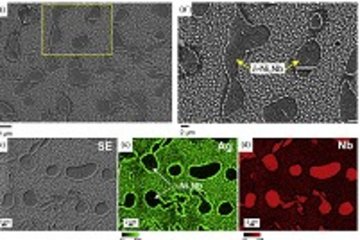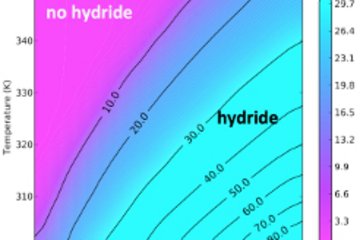All genres
521.
Talk
From electrons to the design of structurally complex materials. SFB ViCoM conference EPT 2018: From electrons to phase transitions, Vienna, Austria (2018)
522.
Talk
Exploration of Large Ab Initio Data Spaces to Design Structural Materials with Superior Mechanical Properties. Hume-Rothery Award Symposium, TMS 2018, Phoenix, AZ, USA (2018)
523.
Talk
Phonon broadening in high entropy alloys. TMS 2018, Phoenix, AZ, USA (2018)
524.
Talk
Energetics of non-stoichiometric stacking faults in Fe–Nb alloys: An ab initio study. DPG-Frühjahrstagung 2018, Berlin, Germany (2018)
525.
Talk
Understanding the fundamental mechanisms behind H embrittlement: An ab initio guided multiscale approach. Seminar E2M ("Wall Forum") at MPI for Plasma Physics, Garching, Germany (2018)
526.
Talk
A first principles approach to model electrochemical reactions in an electrolytic cell. Workshop: The Electrode Potential in Electrochemistry - A Challenge for Electronic Structure Theory Calculations, Schloß Reisensburg, Günzburg, Germany (2017)
527.
Talk
Temperature-driven effects in functional materials: Ab initio insights. Talk at University Pierre and Marie CURIE (UPMC), Paris, France (2017)
528.
Talk
Free energy sampling strategies for structurally complex materials. Workshop II: Stochastic Sampling and Accelerated Time Dynamics on Multidimensional Surfaces, IPAM, UCLA, Los Angeles, CA, USA (2017)
529.
Talk
Materials Discovery and Design at Finite Temperatures. MS&T 2017, Pittsburgh, PA, USA (2017)
530.
Talk
Materials Discovery and Design on Grain Boundary Migration. MS&T, Pittsburgh, PN, USA (2017)
531.
Talk
Theory-guided Design of Novel Fe–Al-based Superalloys. Intermetallics 2017, Educational Center Kloster Banz, Bad Staffelstein, Germany (2017)
532.
Talk
Impact of Magnetism on the Stability of Topologically Close-packed (TCP) Phases in Fe–Nb Alloys. Intermetallics 2017, Educational Center Kloster Banz, Bad Staffelstein, Germany (2017)
533.
Talk
Modelling structural materials in realistic environments by ab initio thermodynamics. EUROMAT 2017, Thessaloniki, Greece (2017)
534.
Talk
Lattice dynamics in high entropy alloys: understanding the role of fluctuations. EUROMAT 2017, Thessaloniki, Greece (2017)
535.
Talk
Impact of magnetic fluctuations on phonons: a Green's function-based approach. MPIE-ICAMS workshop, Ebernburg, Germany (2017)
536.
Talk
Efficient approach to compute melting properties fully from ab initio with application to Cu. MPIE-ICAMS workshop, Ebernburg, Germany (2017)
537.
Talk
Ab-initio investigation of the role of kappa carbide in upgrading Fe–Mn–Al–C alloy to the class of advanced high-strength steels. ArcelorMittal Global R&D Gent, Thessaloniki, Greece (2017)
538.
Talk
1 Billion Tons of Nanostructure - Metastability Alloy Design and Segregation Engineering. 38th Risø Intern. Symp. Materials Science Advanced Metallic Materials by Microstructural Design , Roskilde, Denmark (2017)
539.
Talk
Fundamental compositional limitations in the thin film growth of metastable alloys. Rapidly Quenched & Metastable Materials 16, Leoben, Austria (2017)
540.
Talk
Metastability Alloy Design. 16th Intern. Conference on Rapidly Quenched and Metastable Materials (RQ16), Leoben, Austria (2017)











